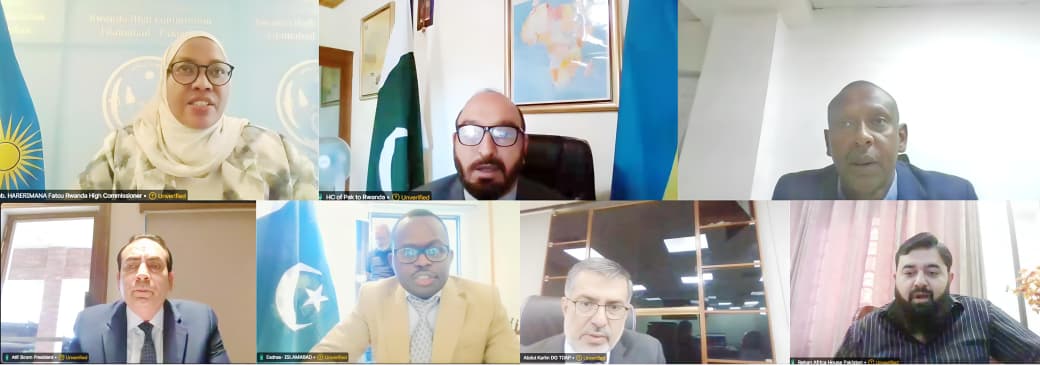ISLAMABAD ( WNAM REPORT ): Rwanda’s High Commissioner to Pakistan, Harerimana Fatou, reaffirmed her country’s readiness to support all private-sector ventures between Pakistan and Rwanda during a virtual business meeting jointly organized by the Rwanda High Commission in Pakistan and the Rwanda Development Board (RDB).
Highlighting the shared vision of South–South cooperation, High Commissioner Fatou said both nations are committed to deepening trade and investment linkages across multiple sectors.
“Rwanda serves as a gateway to East Africa, while Pakistan stands as a vibrant market economy in South Asia — together, we can drive meaningful outcomes through constructive business collaboration,” she said.
Participants from the Federation of Pakistan Chambers of Commerce and Industry (FPCCI), Rwanda’s Private Sector Federation (PSF), Rwanda Development Board, and Pakistan’s Trade Development Authority (TDAP) exchanged views on emerging opportunities and practical steps to expand bilateral trade.
FPCCI President Atif Ikram Sheikh emphasized agro-processing, manufacturing, and services as promising areas for partnership. Commending Rwanda’s investor-friendly climate, he said its policies offered “a model for other African economies” and proposed the establishment of a Pakistan–Rwanda Business Council alongside negotiations for a Preferential Trade Agreement (PTA).
A representative of the Rwandan Private Sector Federation noted that the dialogue would accelerate the implementation of memoranda already signed between FPCCI and PSF, further institutionalizing business-to-business cooperation.
The Rwanda Development Board representative presented an overview of Rwanda’s economic environment; citing transparent regulations, zero ownership restrictions for foreign investors, and competitive tax regimes as key factors attracting international investment.
He invited Pakistani entrepreneurs to explore opportunities in logistics, agriculture, tourism, and renewable energy.
TDAP Director General Abdul Karim called for the reduction of non-tariff barriers to enhance market access and underscored the importance of sustained engagement through trade fairs and single-country exhibitions.
He also announced Pakistan’s intent to organize a dedicated trade exhibition in Rwanda to showcase Pakistani products and services.
The interactive session that followed allowed business leaders from both countries to raise sector-specific questions and identify potential areas of collaboration. Discussions focused on enhancing logistics connectivity, exploring joint ventures, and building institutional mechanisms to facilitate private-sector partnerships.
Islamabad, November 6 — Rwanda’s High Commissioner to Pakistan, Harerimana Fatou, reaffirmed her country’s readiness to support all private-sector ventures between Pakistan and Rwanda during a virtual business meeting jointly organized by the Rwanda High Commission in Pakistan and the Rwanda Development Board (RDB).
Highlighting the shared vision of South–South cooperation, High Commissioner Fatou said both nations are committed to deepening trade and investment linkages across multiple sectors.
“Rwanda serves as a gateway to East Africa, while Pakistan stands as a vibrant market economy in South Asia — together, we can drive meaningful outcomes through constructive business collaboration,” she said.
Participants from the Federation of Pakistan Chambers of Commerce and Industry (FPCCI), Rwanda’s Private Sector Federation (PSF), Rwanda Development Board, and Pakistan’s Trade Development Authority (TDAP) exchanged views on emerging opportunities and practical steps to expand bilateral trade.
FPCCI President Atif Ikram Sheikh emphasized agro-processing, manufacturing, and services as promising areas for partnership. Commending Rwanda’s investor-friendly climate, he said its policies offered “a model for other African economies” and proposed the establishment of a Pakistan–Rwanda Business Council alongside negotiations for a Preferential Trade Agreement (PTA).
A representative of the Rwandan Private Sector Federation noted that the dialogue would accelerate the implementation of memoranda already signed between FPCCI and PSF, further institutionalizing business-to-business cooperation.
The Rwanda Development Board representative presented an overview of Rwanda’s economic environment; citing transparent regulations, zero ownership restrictions for foreign investors, and competitive tax regimes as key factors attracting international investment.
He invited Pakistani entrepreneurs to explore opportunities in logistics, agriculture, tourism, and renewable energy.
TDAP Director General Abdul Karim called for the reduction of non-tariff barriers to enhance market access and underscored the importance of sustained engagement through trade fairs and single-country exhibitions.
He also announced Pakistan’s intent to organize a dedicated trade exhibition in Rwanda to showcase Pakistani products and services.
The interactive session that followed allowed business leaders from both countries to raise sector-specific questions and identify potential areas of collaboration. Discussions focused on enhancing logistics connectivity, exploring joint ventures, and building institutional mechanisms to facilitate private-sector partnerships.


